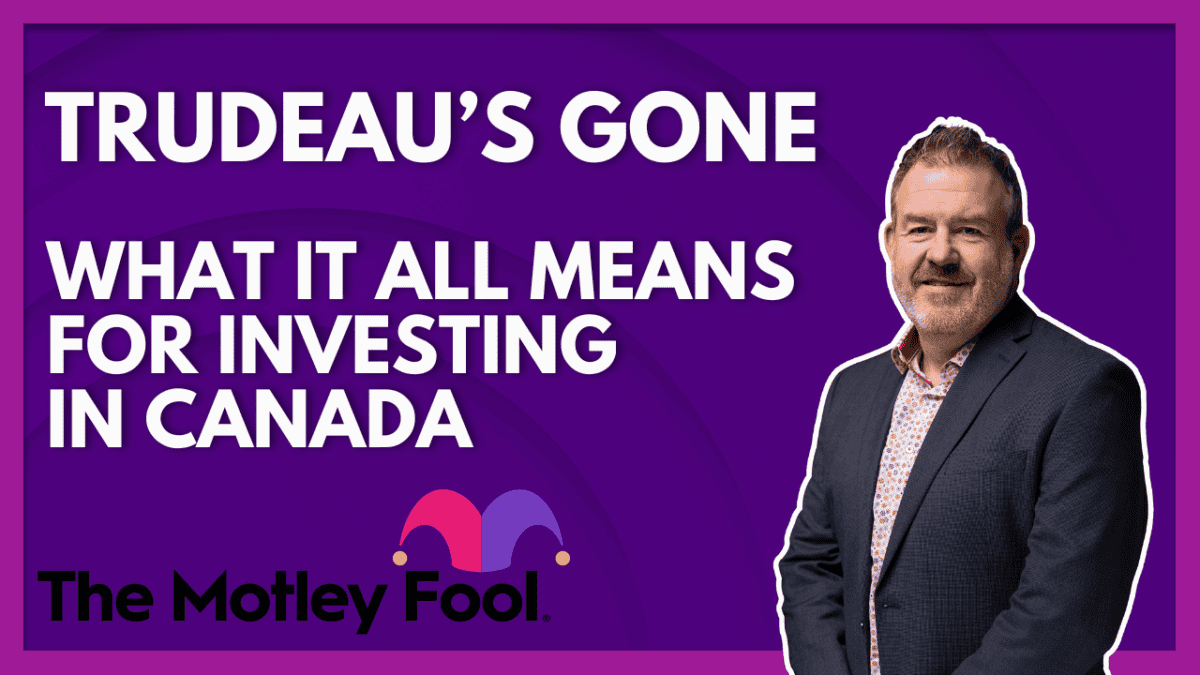Justin Trudeau has resigned as Canada’s prime minister. How will the political shakeup affect the investing landscape in the country?
In this five-minute video, Motley Fool Canada advisor Jim Gillies imagines how things could change for business and investing in the years ahead.
Prefer to read? There’s a transcript below.

Transcript
Nick Sciple: I’m Motley Fool Canada senior analyst Nick Sciple, and this is “The Five-Minute Major,” here to make you a smarter investor in about five minutes.
Today, we’re discussing Justin Trudeau’s resignation as head of the Liberal Party and its implications for Canadian investors.
My guest today is Hidden Gems Canada lead advisor Jim Gillies. Jim, thanks for joining me.
Jim Gillies: Thanks for the invite, Nick.
Nick: Without further ado, on January 6, Justin Trudeau announced his resignation as Liberal Party leader after over a decade as the leader of the party and nearly as long as prime minister. Parliament will be suspended until March 24 while the party works to select its new leader. Jim, this shakeup comes amid a shaky Canadian economy and some economic threats from U.S. President-elect Donald Trump. What does this change in leadership in Canada mean for investors?
What Trudeau’s resignation as prime minister means for investors
Jim: I’m going to try to stay as non-political as possible and probably fail anyway. And I’m also going to have the conceit that I’m going to presume I know the outcome. And so just remember that reality — while it might be similar to what I suggest — is absolutely going to unfold differently.
Bluntly, the Liberal Party of Canada, it doesn’t matter who they pick as the next leader, they’re cooked. They are going to lose the next election.
Probably badly. In Canada, while we have more than two main parties, there’s really only one alternative.
Canada tends to flip about every decade between the Liberal Party of Canada or the Conservative Party.
There’s going to be, in my opinion, an incoming Conservative government headed by Prime Minister Pierre Poilievre.
Now, that next government is going to do a number of things that I think actually, in spite of the, shall we say, slightly negative setup you gave me,
I think is actually going to be beneficial. I’m choosing to be optimistic here.
So I think they are going to be cutting taxes, specifically the carbon tax. Mr. Poilievre — sorry, I can never pronounce his name.
He likes to have a catchphrase and a branding. He’s calling it a “carbon tax election.”
Don’t know that that rolls off the tongue, but whatever. I think there’s going to be some addressing of recent hikes in capital gains, which have not actually gone through Parliament, which is now closed, as you say. I think those will quietly go away. And I think there’s probably going to be a lot of other taxes being lowered as well as parts of the civil service are going to be culled.
Future of Canada’s economy
I think an incoming election is going to be focused heavily on productivity. So the GDP per capita in Canada has badly lagged that of the U.S. over the past decade.
Poilievre has signaled that they are going to be looking to increase exports of resources. We have what the world wants: oil and gas, uranium, potash.
And he’s actually responded to the assertions that we are ripping off your fine nation with a trade deficit.
He’s saying, yeah, we are being ripped off. We’re selling to you at below market rates.
He’s actually kind of signaled that if you want to throw tariffs and you don’t want our stuff, that’s fine.
We’re going to be doubling down on infrastructure and extra capital spending. And I think that’s a good thing.
I think overall, Poilievre is going to make an environment, or seek to make an environment at least, where capital has a friendlier destination in Canada than it’s had over the past decade.
Stocks that could benefit
Nick: So you think about a change in administration, a natural question is who benefits? You talked about maybe some potential policy changes. As an investor looking for a destination for their capital, do you see any potential winners and losers from Canada’s change in political leadership among investable businesses?
Jim: I think it’s going to be resource companies for the win. Oil and gas I think will do well. So pick your favorite. Canadian Natural Resources (TSX:CNQ). I know you like. Tourmaline (TSX:TOU).
Topaz (TSX:TPZ), International Petroleum (TSX:IPCO). I think uranium is going to do very well. So Cameco (TSX:CCO). I think potash again, as I mentioned, so there’s your Nutrien (TSX:NTR).
I think as well, the banks will probably, in a more capitalistic friendly nation, the Canadian banks will probably benefit. And I think Canada is going to be more open for business, more pro-business than the current government has been. And again, I’m trying to stay fairly apolitical here.
As some people will, of course. Like or dislike that, that’s fine. I’m just trying to swim in the waters that I understand.
How politics and policies affect investment process
Nick: Jim, maybe one last question for you. More broadly, obviously eyes train towards the political environment when you have a changeover in administration. When you think long term, though, how important is policy analysis, the political environment to your investment process?
Jim: In truth, it’s not really. We get the governments we get. You know, I am but one vote in the broad democratic system.
And I am largely powerless to influence the outcome. So I just essentially, as I said, I have to swim in the water I’m given and I have to deal with the environment that exists when I make my recommendations.
Nick: Well, Jim, it’s time to go swimming. We’re out of time for this edition of “The Five-Minute Major.” Thanks so much for joining us and we’ll see you next time.







